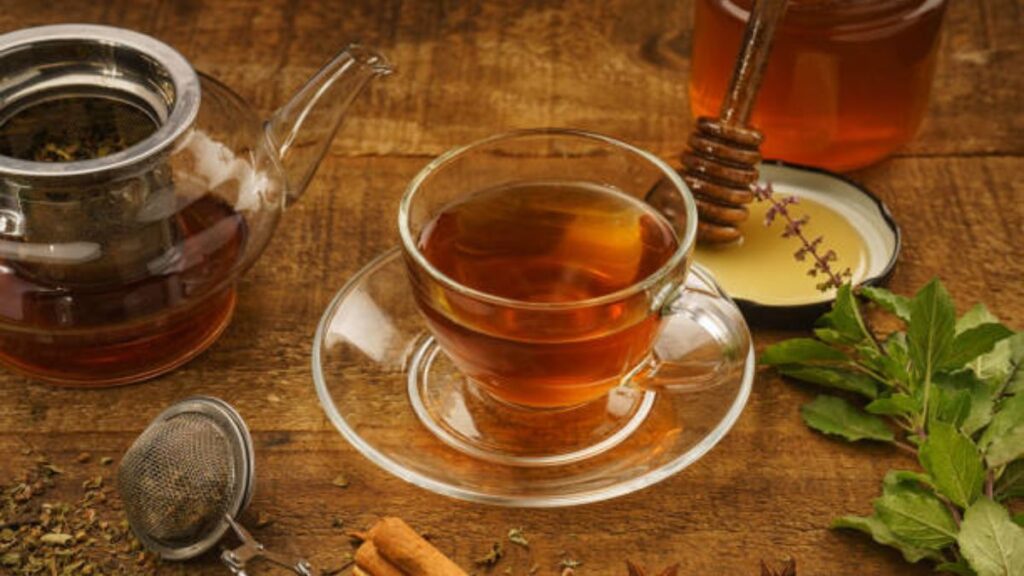Introduction:-
Tea Essentials: Which Brews Pack a Punch for a Healthy Body

In a world filled with beverage options, tea stands out not only for its diverse flavors but also for the myriad of health benefits it offers. From calming herbal blends to robust black teas, the choices are endless. In this exploration of “Tea Essentials: Which Brews Pack a Punch for a Healthy Body,” we delve into the diverse world of teas and uncover the unique properties that make certain brews essential for promoting overall well-being.
Green Tea Essentials: The Elixir of Antioxidants
- Chamomile Tea: Tranquility in a Cup
For those seeking a calming and soothing brew, chamomile tea is the go-to choice. Known for its mild, floral flavor, chamomile tea boasts natural calming properties that can help alleviate stress and promote better sleep. The presence of chamomile’s antioxidants and anti-inflammatory properties further contributes to its potential in supporting digestive health. A warm cup of chamomile tea in the evening can be a delightful ritual, offering both taste and tranquility.
- Black Tea: Bold Flavor, Robust Health Benefits
Black tea, renowned for its bold flavor profile, also brings a host of health benefits to the table. Rich in antioxidants like theaflavins and thearubigins, black tea may aid in reducing cholesterol levels, promoting heart health, and even improving gut function. The caffeine content in black tea provides a moderate energy boost, making it an excellent choice for those looking to kickstart their day with a flavorful and invigorating cup.
- Peppermint Tea: A Digestive Dynamo
Peppermint tea is not just a refreshing delight; it’s a digestive dynamo. The menthol in peppermint has been associated with relieving indigestion, bloating, and irritable bowel syndrome (IBS). Sipping on peppermint tea after a meal can help soothe the digestive tract and alleviate discomfort. The invigorating aroma of peppermint adds an extra layer of pleasure to this tea, making it a favorite for those seeking digestive relief with a burst of flavor.
- Oolong Tea: The Metabolism Booster
Oolong tea strikes a delightful balance between green and black tea, offering a unique flavor profile with a range of health benefits. Known for its potential to boost metabolism and aid in weight management, oolong tea contains polyphenols that may contribute to fat burning. Additionally, oolong tea is rich in antioxidants that support overall well-being, making it a valuable addition to a health-conscious tea repertoire.
- Turmeric Tea: Golden Goodness for Inflammation
Turmeric, with its active compound curcumin, has gained widespread recognition for its anti-inflammatory properties. Turmeric tea, often blended with complementary spices like ginger and black pepper, delivers a warming and earthy cup full of health benefits. Regular consumption of turmeric tea may help reduce inflammation, alleviate joint pain, and contribute to overall joint health. Embracing the golden goodness of turmeric in tea form is a flavorful way to incorporate this potent spice into your daily routine.
- A Vibrant Hibiscus Tea And Antioxidant Infusion
Known for its striking ruby-red hue, hibiscus tea is not only visually appealing but also packs a punch in terms of health benefits. Rich in antioxidants and vitamin C, hibiscus tea may contribute to lower blood pressure and improved heart health. The tart and tangy flavor profile of hibiscus tea makes it a refreshing choice, whether enjoyed hot or cold. Embrace the vibrancy of hibiscus tea to add a burst of antioxidants to your daily hydration routine.
- White Tea: Delicate Flavor, Powerful Antioxidants
What is the best way to drink tea for health benefits?
To maximize the health benefits of tea, consider the following tips for preparing and consuming tea:

- Choose High-Quality Tea: Start with high-quality tea leaves. Whether it’s green, black, oolong, or herbal tea, selecting a reputable brand or loose leaves can ensure that you are getting the full spectrum of beneficial compounds.
- Limit Added Sugar: Avoid adding excessive sugar to your tea. Excessive sugar intake can counteract the health benefits of tea and contribute to various health issues. If you find your tea too bitter, try gradually reducing the amount of sugar or opt for natural sweeteners like honey or stevia.
- Brew at the Right Temperature: Different types of tea require different brewing temperatures. Follow the recommended temperature guidelines for the specific tea you are preparing. Overheating can result in a bitter taste and may degrade some of the beneficial compounds in the tea.
- Avoid Overboiling: Overboiling water can deplete the oxygen content and alter the taste of the tea. Bring the water to the appropriate temperature for your tea and avoid letting it boil excessively.
- Steep for the Right Time: Pay attention to the recommended steeping times for your tea. Steeping for too short a time may result in a weak flavor, while steeping for too long may lead to bitterness. Adhering to the suggested steeping times allows you to extract the optimal balance of flavors and health-promoting compounds.
- Consider Adding Citrus: Adding a slice of lemon or a dash of citrus juice to your tea can provide a burst of vitamin C and enhance the absorption of certain antioxidants. Citrus fruits complement the flavors of many teas and can be a healthful addition.
- Experiment with Herbal Infusions: Explore herbal teas and infusions beyond traditional tea leaves. Herbal teas like chamomile, peppermint, or ginger can offer unique health benefits and flavors without the caffeine found in traditional teas.
- Drink Tea Between Meals: Consuming tea between meals rather than with them may help enhance nutrient absorption. Some compounds in tea may inhibit the absorption of non-heme iron from plant-based foods, so spacing out your tea consumption from meals can mitigate this effect.
- Stay Hydrated: While tea can contribute to your daily fluid intake, it’s essential to maintain overall hydration with water. Balance your tea consumption with plenty of plain water throughout the day.
- Mindful Consumption: Savor your tea mindfully. Taking the time to enjoy the aroma, taste, and warmth of your tea can enhance the overall experience and may promote relaxation.
What are the health benefits of drinking tea?
Drinking tea offers numerous health benefits, thanks to its rich array of bioactive compounds. Some of the key health benefits include:
- Antioxidant Properties: Tea is loaded with antioxidants such as catechins, flavonoids, and polyphenols, which help neutralize harmful free radicals in the body, reducing oxidative stress and lowering the risk of chronic diseases.
- Heart Health: Regular tea consumption has been linked to a reduced risk of heart disease and stroke. The antioxidants in tea may help improve heart health by lowering LDL cholesterol levels, reducing blood pressure, and improving blood vessel function.
- Weight Management: Certain types of tea, such as green tea and oolong tea, contain compounds like EGCG (epigallocatechin gallate) that may aid in weight loss and weight management by boosting metabolism and promoting fat oxidation.
- Improved Brain Function: The caffeine and L-theanine in tea can enhance brain function by promoting alertness, improving concentration, and boosting mood. Tea may also offer neuroprotective effects, reducing the risk of cognitive decline and neurodegenerative diseases like Alzheimer’s and Parkinson’s.
- Cancer Prevention: Some studies suggest that tea consumption may help lower the risk of certain types of cancer, such as breast, prostate, and colorectal cancer. The antioxidants in tea may help inhibit the growth of cancer cells and prevent DNA damage.
- Digestive Health: Herbal teas like peppermint tea and ginger tea are known for their digestive benefits. They can help alleviate symptoms of indigestion, nausea, and bloating, and promote healthy digestion.
- Immune Support: Tea contains compounds like catechins and polyphenols that have immune-boosting properties. Regular consumption of tea may help strengthen the immune system and reduce the risk of infections.
- Bone Health: Some studies suggest that tea consumption, particularly green tea, may help improve bone density and reduce the risk of osteoporosis, thanks to its high content of flavonoids and phytochemicals.
Overall, incorporating tea into your daily routine can be a simple and enjoyable way to support overall health and well-being.
Conclusion:
In the realm of beverages, tea emerges as a versatile and health-conscious choice. From the boldness of black tea to the soothing properties of chamomile, each type of tea brings its own set of unique flavors and health benefits to the table. By incorporating a variety of teas into your daily routine, you can not only savor diverse tastes but also promote a healthy body and mind. So, the next time you reach for a cup, consider the array of tea essentials available, each ready to pack a punch for your well-being.
FAQs:
- Which teas are best for weight loss? Ans-Green tea and oolong tea are often touted for their potential to aid weight loss. They contain compounds like EGCG (epigallocatechin gallate) that may help boost metabolism and fat burning.
- How does caffeine in tea affect health? Ans-Caffeine in tea can provide a mild stimulant effect, promoting alertness and concentration. However, excessive consumption may lead to negative effects such as anxiety, insomnia, or digestive issues. It’s important to moderate intake, especially for sensitive individuals.
- Are herbal teas as beneficial as traditional teas? Ans-Herbal teas offer various health benefits depending on their ingredients. While they may lack the same antioxidants found in traditional teas like green or black tea, herbal blends can still provide hydration and potentially therapeutic effects from herbs like chamomile, peppermint, or ginger.
- Can tea help with relaxation and stress relief? Ans-Certain teas, such as chamomile, lavender, or valerian root tea, are known for their calming properties and ability to promote relaxation and reduce stress. These herbal infusions can be a soothing addition to a bedtime routine.
References:
- Khan N, Mukhtar H. Tea and health: studies in humans. Curr Pharm Des. 2013;19(34):6141-6147. doi:10.2174/1381612811319340008
- Hursel R, Viechtbauer W, Westerterp-Plantenga MS. The effects of green tea on weight loss and weight maintenance: a meta-analysis. Int J Obes (Lond). 2009;33(9):956-961. doi:10.1038/ijo.2009.135
- Grosso G, Godos J, Galvano F, Giovannucci EL. Coffee, Caffeine, and Health Outcomes: An Umbrella Review. Annu Rev Nutr. 2017;37:131-156. doi:10.1146/annurev-nutr-071816-064941
- McKay DL, Blumberg JB. A review of the bioactivity and potential health benefits of chamomile tea (Matricaria recutita L.). Phytother Res. 2006;20(7):519-530. doi:10.1002/ptr.1900
- Shinomiya K, Inoue T, Utsu Y, et al. Hypnotic activities of chamomile and passiflora extracts in sleep-disturbed rats. Biol Pharm Bull. 2005;28(5):808-810. doi:10.1248/bpb.28.808








